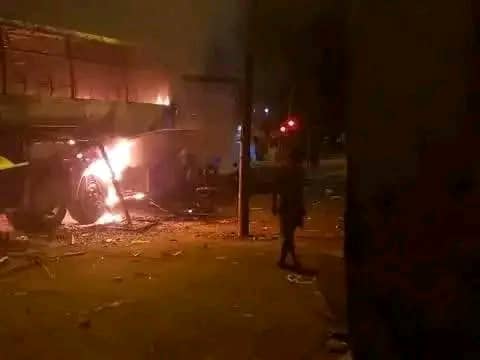
Mozambique is gripped by unrest as violent protests have erupted, leaving the nation in a state of chaos. Protesters have taken to the streets, targeting public transportation and forcing passengers off buses before setting them ablaze. The shocking scenes of burning vehicles have sent waves of fear and uncertainty across the country and its neighbours.
The exact cause of the protests is yet to be fully established, but reports suggest growing public frustration over economic hardships, political dissatisfaction, and escalating insecurity. Demonstrators, some of whom carried banners denouncing government corruption and high living costs, claim they are fighting for justice and a better future.
In major cities like Maputo and Beira, roads have been blocked, businesses forced to close, and public transportation brought to a standstill. Eyewitnesses have described the situation as chaotic, with flames and thick smoke billowing from burning buses.
“We were on the bus when protesters ordered everyone to get off. Minutes later, the bus was set on fire. It was terrifying,” said one passenger who escaped unhurt.
The unrest is the latest in a series of challenges faced by the Mozambican government. Already grappling with insurgencies in the northern Cabo Delgado region, President Filipe Nyusi’s administration now faces mounting criticism over its handling of domestic issues, including inflation, unemployment, and corruption.
The destruction of public property has raised questions about the effectiveness of Mozambique’s security apparatus. While authorities have vowed to restore order, the response has been criticized as slow and inadequate, further fueling public anger.
The unrest in Mozambique poses a potential threat to regional stability, particularly for neighbouring countries like Malawi, Zimbabwe, and South Africa. With Mozambique serving as a key trade route, disruptions in transportation and commerce could have ripple effects across Southern Africa.
Observers fear that if the situation worsens, it could lead to a refugee crisis as Mozambicans flee to neighbouring countries in search of safety. Regional bodies such as the Southern African Development Community (SADC) may be called upon to mediate and help restore calm.
While the fires and destruction of buses have captured headlines, the human cost of the protests is immense. Families are left stranded without transportation, and many fear for their lives as tensions escalate.
The images of burning buses have become a grim symbol of a nation in crisis. Mozambique’s citizens are demanding action, not just words, from their leaders to address the root causes of their grievances.
Mozambique is burning, both literally and figuratively. The fiery protests are a clear sign of a nation grappling with deep-seated issues that require urgent attention.
As the world watches, the Mozambican government must act swiftly to quell the unrest, rebuild public trust, and address the underlying challenges driving its citizens to such extreme measures.
The situation in Mozambique serves as a stark reminder of the fragility of peace and the importance of proactive governance in ensuring stability.














